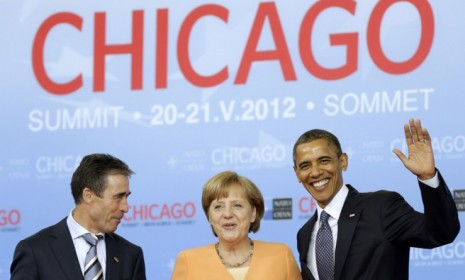The G8 consensus on Europe's debt crisis: Turning point or empty rhetoric?
Under pressure from world leaders, Germany appears to soften its tough austerity stance — though some analysts believe the shift isn't nearly enough to save Europe

A free daily email with the biggest news stories of the day – and the best features from TheWeek.com
You are now subscribed
Your newsletter sign-up was successful
This weekend, President Obama concluded a Group of Eight summit at Camp David by hailing an "emerging consensus" on the best approach to resolving Europe's debt crisis. In a collective statement, the G8 said budget cutbacks should be accompanied by pro-growth policies, which represented a subtle shift for German Chancellor Angela Merkel, the lead proponent of aggressive budget-cutting across Europe. The summit came amid political chaos in Greece, which is creeping toward an exit from the euro currency over popular objections to German-backed austerity programs. Will the G8's new push for growth mark a turning point in the crisis?
No. This is mere rhetoric: Germany was clearly isolated at the summit, with everyone else supportive of the growth measures backed by Obama and new French President Francois Hollande, says Mike Peacock at Reuters. But while the G8 was "strong on rhetoric," its prescription was "bare of any specific policy measures." To have any true impact, Germany would have to give Greece and other heavily indebted nations more time to rein in their deficits. Germany might also have to commit to "common eurozone bonds" to raise financing for less creditworthy nations, which would require Germany to essentially absorb some of the risk presented by Greece. That hasn't happened yet.
"Merkel under pressure…but unbending"
The Week
Escape your echo chamber. Get the facts behind the news, plus analysis from multiple perspectives.

Sign up for The Week's Free Newsletters
From our morning news briefing to a weekly Good News Newsletter, get the best of The Week delivered directly to your inbox.
From our morning news briefing to a weekly Good News Newsletter, get the best of The Week delivered directly to your inbox.
And Merkel won't cede any ground: Merkel agreed to pro-growth policies while practically "under duress" at Camp David, but that won't affect her austerity stance once she's back in Europe, says Douglas A. McIntyre at 24/7 Wall St. Germany holds national elections in 2013, and "German voters are most violently opposed to funding more financial support for their neighbors." Merkel will also likely "take what Obama says with a grain of salt," since he, too, "has not been able to get austerity forces in Congress to move even a little toward his pro-growth stance" for the U.S. economy.
"Merkel will turn her back on G8"
The crisis might be out of the G8's hands: With Greek voters booting out pro-austerity parties, and depositors withdrawing hundreds of millions of euros out of their checking accounts, there might be little that Germany or anyone else can do, says Walter Russell Mead at The American Interest. The bank runs, in particular, "are the method by which public fear can blow up the eurozone." In an interconnected financial system like Europe's, people are only a "mouse click" away from putting their money in a safer bank in Germany or Holland. The powers of Europe will be helpless if bank runs spread to Italy, Spain, and other indebted countries, and "banking systems start exploding like firecrackers."
"Ratcheting up the crisis in Europe"
A free daily email with the biggest news stories of the day – and the best features from TheWeek.com
-
 Film reviews: ‘Send Help’ and ‘Private Life’
Film reviews: ‘Send Help’ and ‘Private Life’Feature An office doormat is stranded alone with her awful boss and a frazzled therapist turns amateur murder investigator
-
 Movies to watch in February
Movies to watch in Februarythe week recommends Time travelers, multiverse hoppers and an Iraqi parable highlight this month’s offerings during the depths of winter
-
 ICE’s facial scanning is the tip of the surveillance iceberg
ICE’s facial scanning is the tip of the surveillance icebergIN THE SPOTLIGHT Federal troops are increasingly turning to high-tech tracking tools that push the boundaries of personal privacy